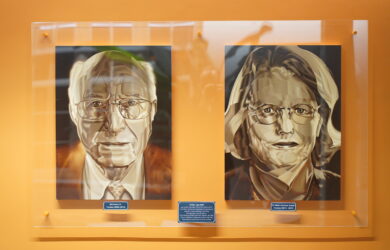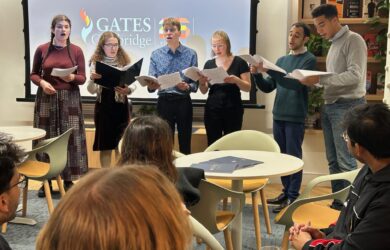
Dr Molly Crockett's work on moral outrage in a digital age is the result of an interdisciplinary approach to today's social problems
I have never felt I would be limited in the tools I could use to seek answers to questions. That might not have occurred to me if I had done my PhD in a more traditional research environment.
Dr Molly Crockett
Midway through her PhD at Cambridge Molly Crockett and her team discovered a critical role for the neurotransmitter serotonin in regulating social decision-making.
“We found that temporarily disrupting serotonin levels made people more willing to punish unfairness,” says Molly. “I had come to Cambridge planning to look at how serotonin affects self-regulation in a broad sense, but the work on punishment shifted my direction. I began attending meetings where punishment was discussed from many different angles, including research in economics and evolutionary biology. That opened my eyes to the possibilities of interdisciplinary research.”
It was this openness to different approaches to challenging questions, championed by her supervisor Professor Trevor Robbins, that was to form the basis of her subsequent research and which has led to her current position as an Assistant Professor of Psychology at Yale University with her own laboratory looking at moral outrage in the digital age and how to reinforce positive social behaviour in an era of Facebook- and Twitter-inspired fury.
Early years
Molly [2006] was born in Irvine, California, and grew up with a love of learning and a particular passion for science supported enthusiastically by her parents, Susan and David, and her middle-school science teacher Cathleen Zeleski. It was only as she was preparing to go to university, however, that she discovered her passion for neuroscience through her UCLA mentor, Professor Matt Lieberman, who spoke to her about his research on social neuroscience, mapping the brain processes involved in social behaviour. “It blew my mind as an 18 year old,” says Molly.
She registered to major in Psychobiology at UCLA, started doing research and did not look back. Professor Lieberman mentored her like he would a graduate student and she got an early taste of what it might be like to do a PhD. She worked on emotion regulation – how putting our feelings into words can regulate our emotional experiences and brain activity.
Throughout her undergraduate years Molly worked on different aspects of research, learning, for instance, about brain scanning, data analysis and how to design experiments. During her senior year she became fascinated by the neurotransmitter serotonin and its role in shaping brain activity and behaviour. It was through this that she learned of the work being done at Cambridge by Professor Trevor Robbins and Dr Luke Clark. She applied to do a master’s to study the serotonin system in humans. “I wouldn’t have moved to Cambridge if it weren’t for the Gates Scholarship programme,” she said.
Cambridge and beyond
Molly initially intended to stay in Cambridge for two years and return to the US for her PhD, but changed her mind and stayed on to examine how people’s decisions about punishment depend on serotonin levels in the brain, resulting in a burgeoning interest in a cross-disciplinary approach to studying the human mind. That interest extended to behavioural economics and how quantifying complex social behaviours using mathematical models could make intractable problems tractable and open to neuroscientific approaches.
So, after finishing her PhD in Experimental Psychology Molly took up a Wellcome Trust post-doctoral fellowship, first at the University of Zurich with Ernst Fehr, Professor of Microeconomics and Experimental Economics. It was, she says, “a tough period”. She had to adapt to a new discipline and academic culture. Her initially planned studies on the psychology of retribution and punishment were largely unsuccessful. “I was thrown in the deep end,” she says, “and I learnt a lot. I tried a lot of things that failed, but those failures and what I learned from them shaped what came next.”
Molly returned to the UK in 2012 where she continued her Wellcome fellowship at University College London, working with neuroscientists Ray Dolan and Peter Dayan. There, she developed new approaches for studying the neural computations that give rise to altruistic behaviour. Integral to this work was her master’s student Jenifer Siegel, who would go on to conduct award-winning research during her doctoral studies with Molly at Oxford and Yale.
Building a lab
While at UCL Molly applied for a professorship at the University of Oxford. The Department of Experimental Psychology was looking for someone who could bridge the gap between social psychology and neuroscience. Molly was appointed Associate Professor of Experimental Psychology and a Distinguished Research Fellow at the Oxford Centre for Neuroethics. She built her first lab at Oxford with Jenifer and another student, Jim Everett, who was already a PhD student at Oxford and looking for a second supervisor to nurture his interests in moral psychology. She received grants from the Wellcome Trust, the Academy of Medical Sciences and the John Templeton Foundation, which allowed her to hire postdocs Andreas Kappes and Hongbo Yu and develop collaborations with philosophers at Oxford and elsewhere. The lab’s research developed computational approaches to investigating the neural basis of human altruism and morality.
Molly describes the four years at Oxford as very productive. She and her team published extensively on how people make moral decisions and how they learn whether others are moral, and explored multiple new research avenues, including field studies of prosocial behaviour at festivals like Latitude and Burning Man, clinical research with Professor Kate Saunders and the application of moral psychology to infectious disease threats with Professor Julian Savulescu and collaborators at the Oxford Martin School. Her final year in the UK saw huge political changes with the Brexit vote and the election of Donald Trump. “Reading about populist movements around the world and this palpable sense of outrage flooding social media made me realise that my research on punishment was still highly relevant,” she says.
Moral outrage in the digital age
So in 2017, having been recruited by Yale and having had time to reflect between wrapping things up at Oxford and moving back to the US, she decided to resume her work on punishment, this time focusing on moral outrage in the digital age. She says it was “part personal therapy and part academic exploration to try and get a grip on troubling trends in the US and UK”.
She recruited Dr William Brady to her laboratory, a talented young scholar who had developed new methods for studying moral expressions on Twitter, and Killian McLoughlin, a data scientist now starting his PhD with Molly at Yale. Together they developed tools for measuring moral outrage online, drawing on social psychology, neuroscience and data science to understand political behaviour. During this period Molly had met with industry leaders and policymakers who were trying to understand how social media platforms’ business models had influenced the political panorama and resulted in the spread of disinformation with regulators trailing behind in the chase to keep up with the fast pace of technological change.
All hands on deck
Molly says the trajectory of her work reflects in part the huge changes that have taken place in the world in the last few years. “The world has changed so much since I was a PhD student,” she says. “It was a simpler time. At the moment it feels like we social scientists have to come together and figure out how to prevent democracy going off the rails or we will not be in a position to carry on our work in 10 to 20 years. This is an ‘all hands on deck’ moment.”
Asked if she has any optimism about the future, Molly says her students make her feel hopeful. “They have grown up online. They understand the complexities of online interaction in ways older people don’t,” she says.
Molly has been on sabbatical over the last year which has given her more time to reflect. Looking back at her time at Cambridge, she says it was formative in her career. “Trevor Robbins is a really unique scientist and has, throughout his career, pursued research questions without respecting traditional disciplinary or methodological boundaries. The Behavioural and Clinical Neuroscience Institute at Cambridge is a fantastic place to be forged into a scientist. I have never felt I would be limited in the tools I could use to seek answers to questions. That might not have occurred to me if I had done my PhD in a more traditional research environment.”
She adds that being part of the Gates Cambridge community meant she had friends from a variety of different fields. “That encourages ‘magpie-style’ science and teaches you how to explain your research to a broad audience. Having these conversations provided excellent training in public engagement.”












